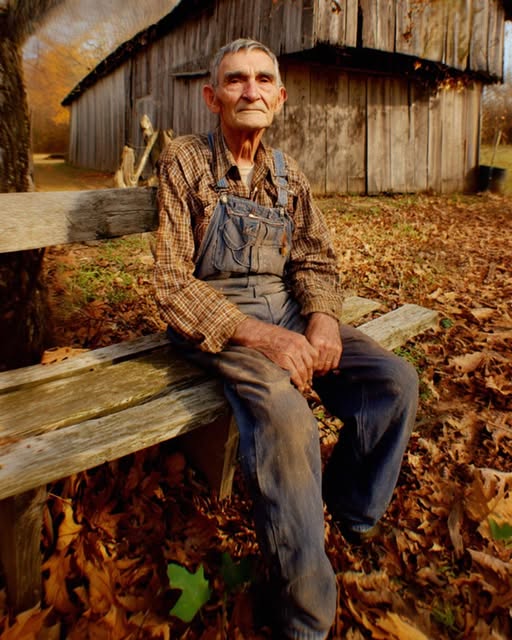I always figured my grandpa was a simple man—overalls, diesel on his boots, a pocket of loose nails he’d carry around like spare thoughts. He wasn’t one for speeches. He taught by showing: how to set a fence post straight, how to read a sky before a storm, how to save what can be saved and let the rest go. Most of my family took his quiet for distance. I knew better. He didn’t talk much, but when he did, it always landed.
When he died last winter, the house hushed in a way the wind couldn’t fill. We gathered at the lawyer’s office expecting a map of small things—hand tools, a truck, maybe a little cash tucked somewhere only a man like him would remember. Instead, the will hit like summer thunder. My uncles and cousins got envelopes of money—real money, not the kind you tuck in a birthday card. And he left the farm to me.
Not to his only daughter. Not to the oldest grandson who already had the keys to the tractor on his belt and a claim in his eyes. To me. With one condition: I couldn’t sell. Keep it running, or it would pass to a wildlife foundation. It was the most him thing I could imagine—stern and soft in the same breath.
My cousin Brent followed me out of the office and smirked like he’d stepped in something. “What’d you do? Sweet-talk the old man into rewriting his life?”
“I just showed up,” I said. “Maybe that was enough.”
The next day I drove to the farm. The paint on the porch rails was peeling the way I remembered; the wind chimes still sang the same three notes when the breeze came from the east. The fields lay stubbled and sleeping. None of it drew me. What tugged, like a thread you can’t help but pull, was the barn.
Growing up, that door was always locked. Grandpa would turn the key, slip it in his pocket, and walk away. Nothing to see in there, he’d say. I believed him because I wanted to, and because some doors you don’t try if the person you love has decided they’re not for you.
But standing in front of it now, I noticed the lock. New. Oiled. The barn wore its years; that lock did not. Whatever secret lived inside had been guarded right up to the end.
I tore the house apart looking for the key—under rugs, in coffee cans, behind recipe cards stained with grease and time. When I finally found it—in a tin behind a stack of index cards for “Pickled Beets, 1969”—my hands shook. The key fit with an easy click that made my chest ache.
The doors groaned open, and dust rose in thin, gold threads. At first, it looked like storage: tarps thrown over hulking shapes, tables arranged in neat ranks, crates stacked with a miser’s precision. But the neatness—that was the tell. My grandpa didn’t stack junk in lines. He laid out plans.
I pulled back the nearest tarp and forgot how to swallow.
It was a chest. Hand-carved, smooth as river stone, inlaid with small polished pebbles that caught the light. Next to it, laid out with a reverence that felt like prayer, were wooden toys. Horses with flowing manes carved from curls of maple. Wagons with tiny brass pins. Dollhouse chairs with spindles no wider than matchsticks. As a kid, he’d sometimes hand us a toy at Christmas—just perfect enough for us to be afraid to play with. We thought he bought them. Standing there, dust in my nose and my heart in my throat, I knew he hadn’t bought a thing.
Five chests sat on the tables, each numbered, each covered with a carved pattern that wasn’t decoration so much as… instructions. Puzzles. The kind that made you talk to yourself without knowing you were doing it.
The first chest took me half a day. I sat cross-legged on the barn’s cold floor, fingers tracing grooves, sliding pieces, listening for the quiet click that meant yes. When the lid finally lifted, I laughed out loud like a child who’d found the prize at the bottom of the cereal box.
Inside lay an envelope and a check for ten thousand dollars.
A letter in his neat, blocky hand: Lily. I hope it’s you reading this. Good work. Here’s your reward. Keep going.
I could hear him, the way he’d say “attagirl” without moving his mouth much. I wiped my cheeks and smiled at the empty air like it was full.
Morning brought a clearer head and a rhythm. Chest two gave quicker. Another letter, another ten thousand, another nudge forward. You must be wondering why I started this. Those toys weren’t store-bought. I made them.
Chest three fought back, then opened to a bundle of rubber-banded letters gone thin at the edges. On top, another note: These are the story of my love with your grandmother. Read them and you’ll understand why this land matters.
I read them on the porch with a blanket over my knees and coffee cooling at my elbow while the last of winter rustled through the oaks. Their words were young and stubborn and funny, their love a thing built like a fence line—post by post, straight even when the ground wasn’t. Harvest counts and broken tractors, fights over whether the south field could handle winter wheat, apologies that read like poems. They argued with tenderness and believed in work the way some people believe in luck.
Chest four nearly sent me to bed defeated. Hours turned to dusk. My back ached. I thought about calling my friend Vanessa, the engineer, then didn’t. This felt like he’d left me a conversation, and I wanted to be the one who listened. When it finally yielded, the note inside was small and sure. You want to know why? Where the money came from? The last chest holds part of my truth. I love you.
I slept badly and woke stubborn. The fifth chest took two days and started to feel like a stand-off. Every time I almost walked away, I saw his hands—scarred from wire and blade and winter—and kept trying. On the fourth morning, the pieces slid into a pattern that felt like a sigh. The lid lifted.
Another check. And a letter that rearranged the man I thought I knew.
I discovered woodworking here, it read. Toy horses for your mom when she was small. Boxes, then puzzle boxes. I got good. People started to notice. Collectors paid me more than I knew what to do with. Later, I built safes—beautiful ones that kept people’s treasures—and sold them to men in suits who wouldn’t have walked across my fields for free. I kept it quiet. I preferred the quiet. The farm is our story, mine and your grandmother’s. You don’t have to plow it with a tractor to honor it. There’s internet here—you can still write. Let the quiet strengthen you like it did me. I’ve left enough for you to live and make something of your own. Whatever you choose, I’ll be loving you from the other side. Always. Grandpa.
I sat there with that letter pressed to my chest and finally understood the new lock, the money, the mystery. He had been two men in one body: the farmer we knew and the artist we didn’t. He didn’t speak those things because he didn’t need to. The work said it for him. He trusted me to hear it.
As I stood, blinking, something caught my eye at the edge of the beam where the light slanted sharp. A small carving tucked into a seam in the wood. I worked it loose. A key—tiny, wooden, clearly made by his hands. On one side, two letters burned in with a steady tip: M and L. Margaret and Lily. Grandma and me.
“Looks like you left me one more,” I said to the empty barn, and the wind thread through the rafters like a laugh.
I told my mother and uncles what I’d found and watched the flash of envy in some eyes, the acceptance in others. Brent stalled out at anger and stayed there a while. That was his choice. I chose the farm.
I didn’t become a full-time farmer. Not yet. I kept a few acres in cover crops, rented out the north field to a neighbor for his alfalfa, planted a ridiculous amount of zinnias by the fence just because they made the mornings brighter. The barn is my workshop now—his chisels on pegs, his planes oiled, my notebooks stacked where the chests had been. I’m learning to carve. Slowly. Badly. Joyfully. I write on the porch most afternoons at a table that looks out at everything they built and everything they hoped.
Sometimes I take the bundle of letters to the steps and read a page at random, just to feel them near. Sometimes I hold the little wooden key and imagine there’s another box somewhere, hidden in the belly of this place, waiting to be opened when I’m ready for the next part.
It turns out, the secret in the barn wasn’t a stash of money, though there was that. It wasn’t even the cache of toys or the puzzle chests lined up like a quiet dare. It was the truth about who my grandpa really was: a maker. A keeper of stories that needed hands to tell them. A man who chose silence not because he had nothing to say, but because he trusted the ones he loved to listen hard enough to hear it anyway.
I thought I knew him. Now I know him better. And as the wind comes across the field and the chimes pick out their three-note song, I think he knew me too. Enough to leave a lock, a key, and a life I can grow into—one quiet, stubborn piece at a time.


